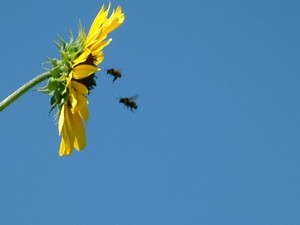27 Feb Fri 2009
Shh! The trees are sleeping!

Sleep. What we take for granted with animals and microorganisms to some people seems outrageous when considered a behavior associated with plants and fungi. But it is a fact that the metabolism of plants and fungi changes periodically during the day or night to allow them rest.
Plants explore their environment, communicate threats and opportunities with each other using chemcial and electrical signals, undertake interspecies communication, and have even sometimes been known to train each other and members of other species to adapt unnatural behavior (a process of domestication - especially common with sunflowers and ants, which can be summoned to a particular part of the plant under attack when the plant uses "ant" chemical language).
Some flowers close and open as the temperature changes so their reproductive organs aren't damaged by the freezing or baking temperatures. Some plants move very quickly: carnivorous plants like the Venus Fly Trap are quick enough to catch flies, and the Kudzu plant, the friend to all travelers needing shelter for the night, will grow you a house if you ask it nicely, or return your embrace at night.
But, usually, plants move very slowly. So slowly that most people don't even think about it.
Yet farmers have to think at plant-speed. We trim the roots of our plants so they can eat better, we pile fresh delicious soil on them from the aisles so they have good food to eat where they want it. We "listen" to their communications and meet their needs. We help them get to where they are trying to forage, and even shepherd our vines and canes about our fields.
Some of our plants need friends, others like to be left alone. Some like friends of different species, others prefer the company of their own kind. Some plants are male and others are female, others are both male and female, others are neither male nor female. Of course, sexual plants get lonely if they are only among their own sex, and require a particular ratio of male to female for proper socialization.
When we walk among our trees at night, we like to talk softly - not because our trees will wake up if they hear us (trees cannot hear sound vibrations), but because we like to listen to them sleep. We listen to the grasses and the trees - those mortal enemies - resting in peace, the joyful songs of the coyotes and bobcats as they work in our fields, protecting our crops from the herbivores that would destroy them. In the heat of the day we listen to the screams of the eagles defending our plants against the herbivores, the roars of the lions, the clucking of our insect-hungry birds, the symphony of singing arachnids (yes, spiders sing various songs of victory, hunger, loneliness, territory, homemaking, and others).
Herbivores ourselves, we like to look at our fellow herbivores as enemies, but they do offer essential services to our garden, fertilizing and controlling weeds, thinning our crops to proper densities, and other things that we would otherwise have to do. Every creature is our friend, and if left to do their work, they leave little for us to do but walk among them in awe, glad to offer what little assistance we can.
We can and do offer the hospitality of food and shelter to all the plants, animals, microorganisms and fungi in our fields; we medicinally treat all the creatures that require aid. This is our job. None of our friends can do it. Humanity was born to serve the world, which so patiently provides us food.

